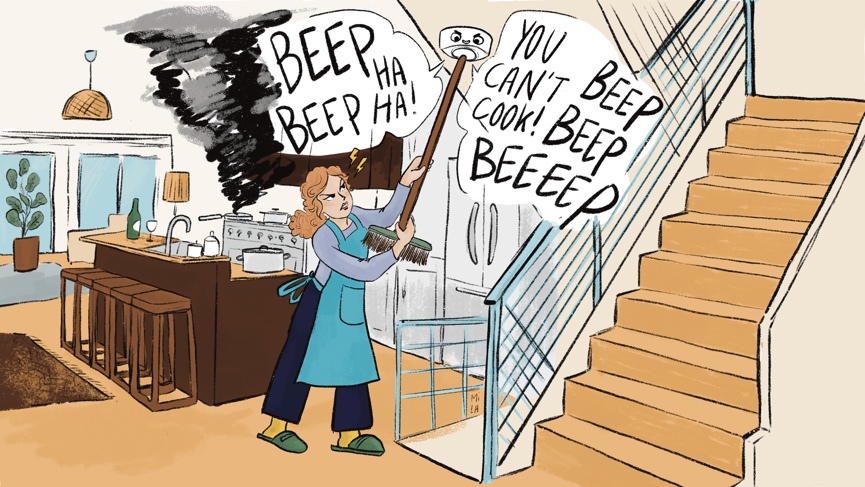- Real Estate, Renting and Co-ownership
- smoke detector , rules on smoke detectors , fire detection in properties , fire detection , Fire Detection Decree , internal circulation route , interlinked smoke detector , centralised detection system , alarm signal , signalling panel , smoke detection requirement , built-in battery , installation of smoke detectors , maintenance of smoke detectors , landlor's responsibility , landlord , tenant
The Government of the Brussels-Capital Region recently adopted a Decree on the obligations concerning fire detection in residential properties (hereinafter 'Fire Detection Decree'), which will enter into force on 1 January 2025.
From 1 January 2025, smoke detectors will not only be compulsory in rented residential properties, but in all residential properties in the Brussels Capital Region.

In this context, the term 'residential properties' means "the building or part of a building used or intended to be occupied by one or several families".
1. Where in the residential properties should smoke detectors be installed?
The new Fire Detection Decree explicitly states how many smoke detectors must be present and where they must be placed, namely:
- In every first room after the main entrance to the residential properties;
- In every room that is part of the internal circulation route.
- In the corridor or in the first room entered from a floor not being on the internal circulation route.
An internal circulation route is "all spaces and corridors that must be crossed to connect the bedroom(s) to the main entrance of the living accommodation".
Note: if at least four mandatory smoke detectors are to be installed in the residential property, it must be equipped with interlinked smoke detectors or a centralised detection system. Interlinked smoke detectors are "smoke detectors interlinked together, either by wire or wave, so that they all transmit the alarm signal from one of them". A centralised detection system is "a fire detection system consisting of smoke detectors connected to a signalling panel".
2. Exceptions
The Fire Detection Decree provides an exception to the mandatory installation of smoke detectors in rooms used exclusively as kitchens, bathrooms and/or showers. Smoke detectors may, but do not have to, be installed in these rooms.
Residential properties equipped with a centralised detection system of the 'partial monitoring' or 'total monitoring' type are also exempt from the smoke detection requirement.
3. What type of smoke detectors and how to install them
Smoke detectors must not be of the ionic type and must have a built-in battery with a service life of ten years or be connected to the electrical circuit (220 volts). If the smoke detector is connected to the electrical circuit, an emergency battery must be fitted. This should ensure that the device continues to function correctly in case of a power failure.
Furthermore, smoke detectors must comply with standard NBN EN 14604 and the central detection system with standard NBN S21-100 1&2.
As regards the installation and maintenance of smoke detectors, these must comply with Belgian and European standards on domestic applications. Failing this, the smoke detectors must be placed as described in Annex 1 of the Fire detection Decree.
4. What are the landlord's and tenant's obligations?
It is the landlord who bears the cost of the purchase and installation of the smoke detectors. The landlord also bears the cost of replacing the smoke alarm at the end of the battery life as specified by the manufacturer. For this purpose, the landlord may conduct an annual inspection to check whether the smoke alarms are working properly.
Furthermore, it is also the landlord's responsibility to replace the smoke alarm no later than the expiry date specified by the manufacturer, or before this expiry date if the smoke alarm is faulty.
The tenant of the property is obliged to notify the landlord in writing if the battery of the smoke detectors is discharged prematurely or in case of failure.
5. Conclusion
It is important that, as a landlord of a property or in your own home, you check carefully prior to the coming into force of the Fire Detection Decree that the property complies with all obligations.
Important to note here is that one more exception was included for landlords: landlords who have already installed 4 or more smoke detectors in accordance with the existing Brussels fire detection rules may keep them without interconnection or a detection system until their replacement date and until 1 January 2028 at the latest. They are therefore not immediately obliged to provide interlinked smoke detectors or a centralised detection system.
For further questions on this topic, please contact our specialists via info@seeds.law or +32 (0)2 747 40 07.





